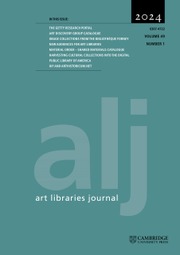No CrossRef data available.
Article contents
Exploring fashion and modernity in the invoices of Edward Livingston, 1891–1917
Published online by Cambridge University Press: 15 December 2016
Abstract
On January 5th, 1903, Mrs. A.M. Dunstan, a designer and dressmaker with an eponymous store on 34th Street, sold a $370 green velvet coat with matching bodice to Clarisse Livingston, a New York socialite. This information, captured from a household invoice within the Edward Livingston papers at the New York Public Library, reveals more than pecuniary data about the sale of clothing at the turn of the century; rather, the invoice contains complex metadata about the relationships between modernity, fashion, and group identity. This paper describes the processes and results of a preliminary study of fashion-related invoices from the Livingston papers and seeks to demonstrate that invoices are a rich, yet often overlooked source of cultural data.
- Type
- Research Article
- Information
- Art Libraries Journal , Volume 42 , Special Issue 1: Fashion - Resources and Research , January 2017 , pp. 13 - 18
- Copyright
- Copyright © ARLIS/UK&Ireland 2017
References
1. David W. Chen, “A Livingston Legacy Revived; Speaker-to-Be Has Rich Bloodlines in North and South” New York Times, November 23, 1998, accessed June 12, 2016, http://www.nytimes.com/1998/11/23/nyregion/a-livingston-legacy-revived-speaker-to-be-has-rich-bloodlines-in-north-and-south.html?pagewanted=all.
2. Ibid.
3. Ibid.
4. Robert R. Livingston, Historical Society of the New York Courts, accessed June 12, 2016, http://www.nycourts.gov/history/legal-history-new-york/legal-history-eras-02/history-era-02-livingston-r.html.
5. “Edward Livingston,” Biographical Directory of the United States Congress, accessed June 12, 2016, http://bioguide.congress.gov/scripts/biodisplay.pl?index=l000366. “William Livingston,” Biographical Directory of the United States Congress, accessed June 12, 2016, http://bioguide.congress.gov/scripts/biodisplay.pl?index=L000374.
6. Brandt, Clare, An American Aristocracy: The Livingstons (Garden City: Doubleday, 1986), 2 Google Scholar.
7. Edward Livingston papers, Manuscripts and Archives Division, The New York Public Library.
8. Ibid.
9. “Making Her Bow To Society,” New York Times, December 13, 1887.
10. Ibid.
11. Ibid.
12. Livingston papers, New York Public Library.
13. Lehmann, Ulrich, Tigersprung: Fashion in Modernity (Cambridge: MIT Press, 2000), 126Google Scholar.
14. Simmel, Georg, Frisby, David, and Featherstone, Mike, Simmel on Culture: Selected Writings (London: Sage, 2000), 13 Google Scholar.
15. Ibid., 188.
16. Ibid., 194.
17. Ibid., 190.
18. Ibid., 189.
19. Ibid., 190–191.
20. Ibid., 244, 246. Capetillo-Ponce, Jorge, “Contrasting Simmel's and Marx's Ideas on Alienation,” Human Architecture: Journal of the Sociology of Self-Knowledge 3 (2004): 117 Google Scholar.
21. Simmel, Frisby, and Featherstone, Simmel, 251.
22. Lionel Pincus and Princess Firyal Map Division, The New York Public Library, “The Albemarle Hotel map of Manhattan, New York City: with index of streets and strangers' directory to business houses, public buildings, principal churches, places of amusement, etc. etc,” New York Public Library Digital Collections, accessed June 12, 2016, http://digitalcollections.nypl.org/items/510d47e4-736d-a3d9-e040-e00a18064a99.
23. “Map: Exploring Fashion and Modernity in the Invoices of Edward Livingston, 1891–1917,” accessed June 12, 2016, https://julialipkins.carto.com/viz/fb3fe06e-f044-11e4-abe1-0e0c41326911/public_map.
24. Ibid.
25. Leach, William, Land of Desire: Merchants, Power, and the Rise of a New American Culture (New York: Random House, 1993), 5 Google Scholar.
26. Ibid., 91–92.
27. Livingston papers, New York Public Library.
28. Simmel, Frisby, and Featherstone, Simmel, 191.
29. Livingston papers, New York Public Library.
30. Simmel, Frisby, and Featherstone, Simmel, 194.
31. “Mrs. Margaret Mulhall, Founder of Dressmaking Firm on 57th Street Dies at 94,” New York Times, December 24, 1944.
32. Leach, Land of Desire, 97.
33. Ibid., 95.
34. Pope, Jesse E., The Clothing Industry in New York (Columbia: University of Missouri, 1905), 288 Google Scholar.
35. Green, Nancy L., “From Downtown Tenements to Midtown Lofts: The Shifting Geography of an Urban Industry,” in A Coat of Many Colors: Immigration, Globalization, and Reform in New York City's Garment Industry, ed. Soyer, Daniel (New York: Fordham University Press, 2005), 39 Google Scholar.
36. Anthony Robins, “National Register of Historic Places: Garment Center Historic District, Section 8” United States Department of the Interior National Park Service (2009), 5, accessed June 12, 2016, http://anthonywrobins.com/National%20Register%20nominations/Garment%20Center%20Historic%20District.pdf.
37. “Ladies’ Mile Historic District: Designation Report,” New York City Landmarks Preservation Commission (1989), 7.
38. Ibid., 7–8.
39. Robins, “National Register,” 5.
40. Page, Max, The creative destruction of Manhattan, 1900–1940, (Chicago: University of Chicago Press, 1999), 26 CrossRefGoogle Scholar, 28.
41. Robins, “National Register,” 7.
42. Brown, Henry Collins, Fifth Avenue, Old and New 1824–1924, (New York: Fifth Avenue Association, 1924), 111 Google Scholar.
43. “Fifth Avenue Hearing. Board of Estimate Will Consider Zoning Law Amendment,” New York Times, December 9, 1917.
44. Edwin H. Hess, “Beneficial Effects of Zoning Plan,” New York Times, April 2, 1916.


